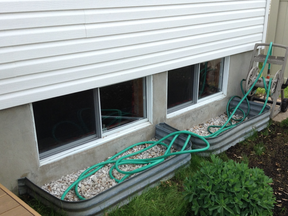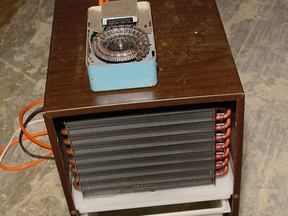
Reviews and recommendations are unbiased and products are independently selected. Postmedia may earn an affiliate commission from purchases made through links on this page.
Q What’s your opinion on those clear covers for basement window wells? Frogs and toads are always falling into the window wells at my place and they can’t get out without help.
A I find those covers very useful. I’ve never seen any drawback using them. I’d definitely install them in your situation. Besides saving those little critters from danger, keeping out snow and direct rain is a great thing. This is especially true with hard rains. I’ve seen situations where lots of rainfall overwhelmed the window well’s ability to drain. The water rose high enough that it actually started to encroach on the window glass. Naturally, there was lots of leaking that could have been avoided if a cover had been present.
Sign up to receive daily headline news from Ottawa Citizen, a division of Postmedia Network Inc.
Thanks for signing up!
A welcome email is on its way. If you don't see it, please check your junk folder.
The next issue of Ottawa Citizen Headline News will soon be in your inbox.
If you can’t find plastic covers to fit your window wells, or if you’d rather not have the covers change the look of your home, you might consider using something called hardware cloth. This is a heavy metal screen with a 1/4” spacing between wires. Place a slightly oversized piece of hardware cloth over the window well, with small rocks or bricks on the sides to hold the screen down. This won’t keep out excess water, but it will keep any and all critters out and safe. This is what I use at my place since my window wells are under a verandah and there’s not enough headroom for any kind of elevated cover.
———

Basement musty smells
Q What can I do to get rid of a musty smell in my basement? My basement is on bedrock and some areas of the wooden floor have moist spaces underneath where the rock drops away. There are no windows to open.
A Basements with bedrock showing through tend to have moisture and humidity challenges. That’s because bedrock is typically cold enough that it triggers condensation when warm, moist basement air comes in contact with the stone during summer. Even when active leaking isn’t happening, outside air brings moisture inside.
Begin by putting a humidity meter down there to see what’s what. 80% or 90% are typical relative humidity levels for basements like yours in summer, and this is way too high. Anything over 65% to 70% starts to trigger musty smells.
Some questions come to mind:
My own rule of thumb (and it works quite well), is to keep all basement windows closed when it’s warmer outside the basement than inside. Also, at times like these, run a large dehumidifier until relative humidity is lower than 70%. That’s the maximum safe humidity level. Whenever it’s cooler outside than inside the basement, opening the windows will lower humidity without using the dehumidifier.
One more thing … many basements are cool enough that dehumidifier coils will develop frost and stop working. Anything cooler than 15ºC can lead to this. Plug your dehumidifier into a light timer and have the unit shut off for 15 minutes every hour. This lets coils defrost, so dehumidification can happen again when the unit starts up again.
Steve Maxwell has a bedrock basement in his home on Manitoulin Island, Ont. Visit Steve online at BaileyLineRoad.com for made-in-Canada information on renovations, new buildings, power tools and outdoor living.


